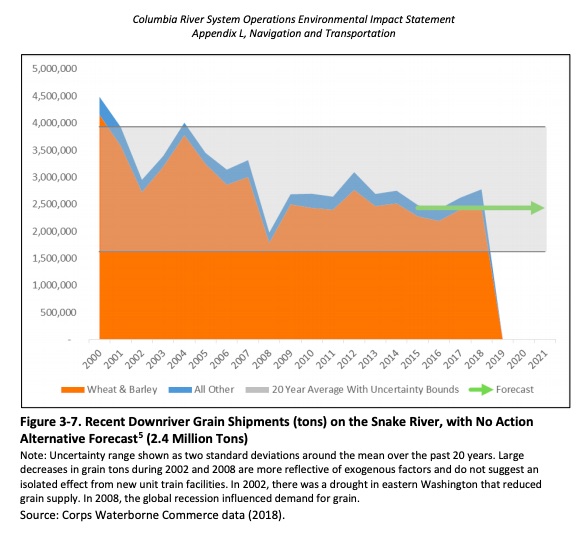forum
library
tutorial
contact

Farmers Skeptical of Inslee-Murray Plan,
Oppose Breaching Dams
by Matthew Weaver
Capital Press, October 26, 2021
|
the film forum library tutorial contact |

|
Farmers Skeptical of Inslee-Murray Plan,
by Matthew Weaver
|
"We are confident that the environmental impact statement released in 2020 provides definitive evidence...
and we will strongly oppose any efforts to undermine the countless time and resources that were put into
the development of those findings," -- Michelle Hennings, Washington Association of Wheat Growers.
 Farmers hope the benefits of the Columbia-Snake river system don't get lost as two of Washington's top Democrats "assess" breaching four dams on the lower Snake River.
Farmers hope the benefits of the Columbia-Snake river system don't get lost as two of Washington's top Democrats "assess" breaching four dams on the lower Snake River.
U.S. Sen. Patty Murray and Gov. Jay Inslee want a joint federal-state process to consider salmon recovery, including potentially breaching the four dams on the lower Snake River, long targeted by environmental groups.
Murray and Inslee say they will engage in "robust" outreach to communities across the region. Recommendations will be made by July 31.
Washington wheat farmers rely on the system to move their crop to customers around the world, said Michelle Hennings, executive director of the Washington Association of Wheat Growers.
"We remain strongly opposed to any efforts to breach the lower Snake River dams, which would cause undue harm to the food supply, weaken vital agricultural exports and remove a critical clean energy source -- all without necessarily moving the needle on desired salmon recovery efforts," Hennings said.
"It is critical that wheat growers have a meaningful seat at the table," she said.
The association plans to work directly with Murray, Inslee and the rest of the state's congressional delegation to "ensure our voice is heard and that removal of the dams remains off the table," she said.
"Time and time again, federal and state efforts to evaluate the economic and environmental impacts of breaching the lower Snake River dams have come to the same conclusion: dam removal is an extreme -- and unnecessary -- measure that would not only destroy a critical transportation network for agricultural exports, inputs ... but would also harm the environment and impact power supply and reliability," said Glen Squires, CEO of the Washington Grain Commission. "We remain committed to finding collaborative, science-based salmon recovery plans that consider the impacts on all stakeholders, particularly on wheat growers dependent on the lower Snake River dams. Dam breaching is not a viable path forward."
"Salmon recovery needs to avoid a single approach focused on destroying necessary infrastructure and instead look at the full picture of the issues impacting these populations," said Clint Carlson of the Oregon Wheat Growers League.
Hennings and Carlson pointed to a 2020 environmental impact statement conducted by the U.S. Army Corps of Engineers, Bureau of Reclamation and Bonneville Power Administration. It concluded dam breaching was not feasible. The report cited higher energy costs and greenhouse gas emissions, higher transportation costs for farmers and the loss of irrigation water for 48,000 acres of farmland.
"We are confident that the environmental impact statement released in 2020 provides definitive evidence that dam breaching is not the solution, and we will strongly oppose any efforts to undermine the countless time and resources that were put into the development of those findings," Hennings said.
"That process had robust public participation, rigorous scientific analysis and resulted in a conclusion that does not include breaching the four lower Snake River dams," Carlson said. "We are concerned that an individual state would propose to develop a separate process in which the outcomes would have a widespread impact throughout the Pacific Northwest."
The National Association of Wheat Growers will work to educate stakeholders about grower concerns with removing the dams, which would make the river system "unnavigable and jeopardize wheat farmers and the rural economy," CEO Chandler Goule said.
learn more on topics covered in the film
see the video
read the script
learn the songs
discussion forum
